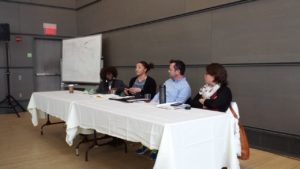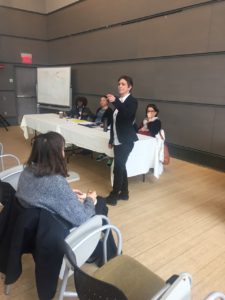
A panel of Boston-area practitioners speaks to Tufts University students about climate justice issues during a February 2017 UEP colloquium.
The following piece was submitted by Tufts undergraduate student Sika Gadzanku.
At its core, Climate Justice is a social justice and human rights issue.
Climate Justice is working to rectify economic, racial and social inequities that exist when discussing the benefits and burdens of climate change and environmental degradation. It is the conscious effort to be intersectional in any measure aimed at mitigating climate change and acknowledging that marginalized communities suffer the most from the effects of climate change.
Master’s in Public Policy students at Tufts University’s Environmental and Urban Planning (UEP) program organized a panel that discussed the importance and place of climate justice within the larger umbrella of combating climate change. The panelists were:
- Kalila Barnett – Executive Director of Alternatives for Community & Environment (ACE), a Roxbury-based climate justice organization
- Dr. Atyia Martin – Chief Resilience Officer for the City of Boston
- David McMahon – Co-executive director of Dismas House of Massachusetts, a member of the Worcester Green Low Income Housing Coalition (WGLIHC), a coalition of organizations serving the homeless, formerly incarcerated individuals and low-income communities
- Maria Belen Power – Associate Executive Director of Chelsea GreenRoots, Inc., a Chelsea-based climate justice organization
The discussion centered on how the communities of Chelsea, Roxbury, Worcester and, to an extent, the greater Boston area are making their communities more resilient in the face of social, economic, racial and health challenges.

A panel, assembled by graduate students of the Urban and Environmental Policy and Planning program, takes questions from the audience.
The key takeaways were:
- Climate justice for low-income communities must be prioritized
“Chelsea has 24 percent of its residents below the poverty line. The state average is 10 percent,” said Maria Belen Power, and added that low-income communities in Massachusetts, largely made up of people of color, will be the worst hit by climate change. It’s already happening and is projected to get worse. Thus, a big part of the work of organizations like GreenRoots, Inc. and ACE are partnering with the state government to outline resilience efforts and educate residents in these areas on the dangers of climate change and the benefits of green living.
- Combating climate change must include obvious co-benefits
Panelists stressed the need to be truly intersectional when dealing with climate justice since residents of low-income communities face additional economic, social and racial inequities. Kalila Barnett spoke on the importance of working better to connect environmental and economic issues such that addressing a problem provided a co-benefit. That is, solving an environmental issue also provides an economic benefit. In her view connecting these issues only serves to increase community engagement. Additionally, David McMahon of Dismas House highlighted how a homeless shelter invested in solar power – reducing its electric bill from $20,000 to $0 while enjoying a $2000 rebate incentive from MassCEC.
- Community engagement and cross-party collaboration is critical
ACE is led by and composed of Roxbury residents which makes their mission and goals more personal. This community-based model has proved effective in building neighborhood support for their activities. ACE, in collaboration with GreenRoots, also community-based, successfully blocked the construction of a diesel-fired power plant planned to occupy the space opposite an elementary school complex in Chelsea.
- Take advantage of Massachusetts’ leadership in green living
As mentioned, investing in green energy presents opportunities for individuals and organizations to reduce their carbon footprint and save money through reduced utility costs. David McMahon highlighted Massachusetts’ place as a leader in green living – it has the best energy efficiency program and fourth largest solar energy generation in the country. Yet, a third of homes are still heated using oil furnaces, which are only 50 percent efficient. With reduced funding sources available to low-income communities to switch out these furnaces drying up, organizations like the Worcester Green Low Income Housing Coalition are spearheading initiatives to reduce carbon footprint and reduce energy costs for their members.
- Marginalized communities deserve a seat at the table
Low-income communities must be given decision making power and some form of equity during the development of resilience projects. Dr. Atyia Martin remarked that giving residents a seat at the table ensures that proposed resilience solutions are actually socially, economically and racially equitable. It ensures the struggles of low-income communities are heard.
Overall, this panel created an avenue to learn more about the need for climate justice and the ongoing work of some climate justice organizations in Massachusetts.
Looking to get involved?
- Identify your skills to know where you will be most useful. Skilled in social media? Volunteer as a publicity intern. Knowledgeable about environmental engineering solutions? Volunteer your services to research and analyzing appropriate technologies for a community-specific issue. Here is a list of some climate justice organizations.
- Bear in mind that any meaningful engagement with residents of low-income communities is based on trust and trust only develops over time.
